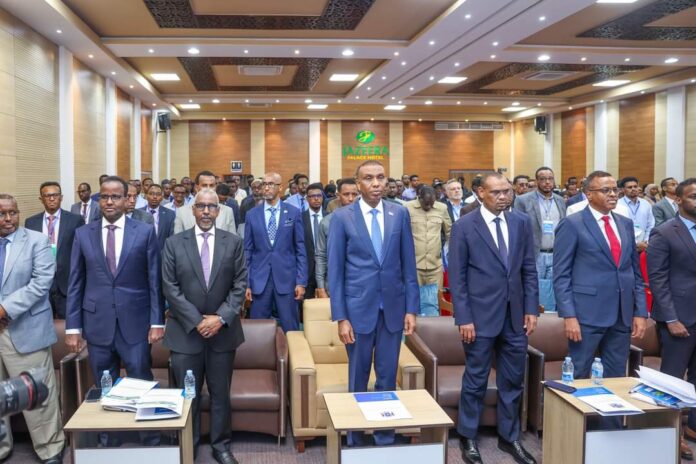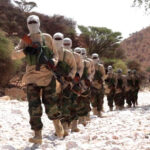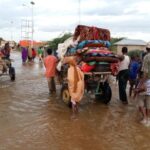MOGADISHU, Somalia — Amidst the vibrant atmosphere of Mogadishu’s political and economic scene, Prime Minister Hamza Abdi Barre officially kicked off the 7th National Economic Policy Forum, marking a significant event in Somalia’s journey towards economic revitalization.
The forum, which commenced on Monday, stands as a beacon of hope and strategy for a nation striving to overcome decades of economic turmoil and instability.
The theme of this year’s forum, “Somalia’s Development Nexus: Economy, Governance, and Social Development,” encapsulates the multifaceted approach needed for sustainable development. It acknowledges the interconnectedness of economic growth, effective governance, and the well-being of society at large. This approach sets the stage for comprehensive discussions aimed at weaving a stronger economic fabric for Somalia.
At the heart of the forum’s agenda are discussions on navigating the post-Heavily Indebted Poor Countries (HIPC) landscape. Somalia, having recently benefited from debt relief initiatives, now faces the challenge of leveraging these gains toward sustained growth. Experts and policymakers are expected to share insights on utilizing debt relief to fund critical infrastructure, education, and health services, setting the foundation for economic stability.
Agricultural improvements form another pillar of the forum. Somalia’s agricultural potential remains largely untapped, with vast areas suitable for cultivation, yet plagued by inefficiencies and lack of modern practices. The forum seeks to address these issues by promoting agricultural innovation, investment in rural infrastructure, and policy reforms that encourage both local and foreign investment in farming technologies.
Food security, a persistent challenge, will see deliberations on how to safeguard against famine and malnutrition. The forum aims to outline strategies for increasing agricultural productivity, improving distribution channels, and enhancing the resilience of food systems against climate shocks.
The concept of the blue economy, encompassing the sustainable use of marine resources, will also be a focal point. Somalia’s coastline offers opportunities in fishing, maritime transport, and coastal tourism. Participants will explore how to develop these sectors while ensuring environmental sustainability, aiming to turn Somalia’s coastal areas into economic powerhouses.
Inclusive growth, with a special emphasis on women’s empowerment, reflects the forum’s commitment to equitable development. Recognizing that economic progress must benefit all, discussions will focus on creating opportunities for women in entrepreneurship, education, and leadership roles within the economic sector, thereby fostering a more inclusive society.
Prime Minister Barre, in his opening speech, underscored the forum’s role as not just a platform for discussing economic policies but as a catalyst for tangible action. “This forum marks our collective resolve to transform economic challenges into opportunities,” he stated, emphasizing the need for unity in vision and action among all stakeholders.
The forum, attended by a diverse array of participants including government officials, international development partners, local and international investors, academics, and representatives from civil society, is poised to be influential. It’s not just a gathering but a strategic assembly where ideas are forged into policies, partnerships are formed, and the economic future of Somalia is debated and decided.
The outcomes from this forum are anticipated to steer Somalia towards a more prosperous, stable, and inclusive economic path, setting the tone for policy reforms, international cooperation, and sustainable development practices. As Somalia looks to rebuild and redefine its economic landscape, events like the National Economic Policy Forum serve as critical milestones in that journey.






